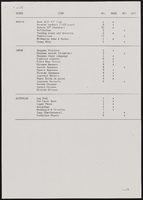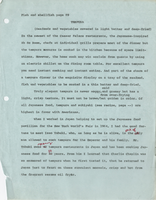Search the Special Collections and Archives Portal
Search Results

June Monroe and Kazuko Atomura oral history interview: transcripts
Date
Archival Collection
Description
Oral history interviews with June Monroe and Kazuko Atomura conducted by Cecilia Winchell and Stefani Evans on July 14 and July 19, 2022 for Reflections: the Las Vegas Asian American and Pacific Islander Oral History Project. In the first interview, Kazuko Atomura describes her childhood in Taiwan and Tokyo, Japan, and shares both happy and difficult mememories of that time. Atomura eventually moved to Los Angeles, California, where she reconnected with a man she previously met in Japan. She married him and together had their daughter, June Monroe, and another son while living in Corpus Christi, Texas. After difficult medical procedures involving Atomura's husband and Monroe's younger brother, Brian, the family relocated to Las Vegas, Nevada. Monroe recalls attending Las Vegas High School and Bonanza High School, and the struggle of making new friends as a young person. In the second interview, the mother and daughter discuss racism, discrimination, and identity. Kazuko Atomura recalls her many experiences with discrimination as a result of both her appearance and language barriers. June Monroe discusses how she came to be proud of her Japanese heritage, while Atomura discusses some of the community activities she has been involved in since living in Las Vegas including the Japanese Culture Club and odori dancing. Then, both Atomura and Monroe discuss Monroe's brother, Brian, who received two kidney transplants; one from Monroe's father and one from Monroe herself. Atomura talks about the shrines she has built for Brian, the experience of him being on dialysis, care taking, and his final days. Monroe shares about her activism with organ donation, being regularly involved with the Nevada Donor Network and helping to pass significant pieces of legislation within the area of organ donation.
Text

Transcript of interview with Toshiyuki "George" Goto by Christina Oda, February 26, 1979
Date
Archival Collection
Description
On February 26, 1979, Christina Oda interviewed Toshiyuki “George” Goto (born 1922 in Huntington Beach, California) about his life in Nevada. Goto first talks about his move to Nevada in 1951 before talking about his family, church activities, politics, and recreational activities. He then discusses the building, economic, and environmental changes in Las Vegas. Goto later talks in depth about his profession in landscaping, including the work he completed for some of the hotels and resorts built on the Las Vegas Strip. The latter part of the interview includes discussion about Goto’s Japanese ancestry and his perceptions as a minority when first moving to and living in Las Vegas. The interview’s conclusion covers the topics of social activities and Goto’s organization of a local chapter of the Japanese American Citizens League.
Text
Sue Fawn Chung Collection on Asians in Nevada
Identifier
Abstract
The Sue Fawn Chung Collection on Asians in Nevada (1963-2015) consists of materials collected by Dr. Sue Fawn Chung in the course of her research on the history of Asians in Nevada. The collection contains interviews, correspondence, and biographical materials primarily focusing on Chinese and Japanese residents in Nevada, but also includes other communities such as Filipinos and Koreans. Some materials are photocopies of original documents and photographs dating between 1913 and 1960.
Archival Collection
Carolyn Freeman oral history interview
Identifier
Abstract
Oral history interview with Carolyn Freeman conducted on January 30, 2006 for the Boyer Early Las Vegas Oral History Project. Freeman begins by discussing her upbringing, her father, who was the president of the Japanese American Citizens League, and her early interest in dancing. She also details her experiences as a Japanese American during World War II and being relocated by the federal government. Freeman then describes how she began her career as a dancer after getting a role in a Broadway play in New York City, New York, and her later experiences dancing in productions in Reno, Nevada and San Francisco, California during the 1950s and 1960s. Lastly, Freeman discusses the differences between living in Las Vegas, Nevada compared to California and being offered the chance to dance in a Frank Sinatra show by himself and Sammy Davis Jr.
Archival Collection



